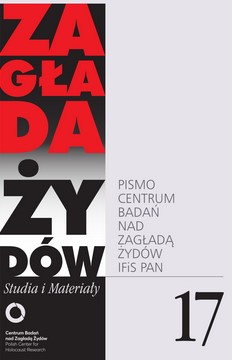Zwykła organizacja, nadzwyczajna przemoc państwowa. Polska policja granatowa a Zagłada we wschodniej części dystryktu krakowskiego
Ordinary organization, extraordinary state violence. Polish navy blue police and the Holocaust in the eastern part of the Krakow district
Author(s): Tomasz FrydelSubject(s): Local History / Microhistory, Government/Political systems, Studies in violence and power, WW II and following years (1940 - 1949), History of the Holocaust, History of Antisemitism, Ethnic Minorities Studies
Published by: Stowarzyszenie Centrum Badań nad Zagładą Żydów & IFiS PAN
Keywords: policja granatowa (‘Blue’ Police); collaboration; General Government; perpetrators; Täterforschung; occupied societies; resistance movement;
Summary/Abstract: This (abridged) article proposes a conceptual model of social interaction to consider the behavior of the ‘ordinary men’ of the Polish ‘Blue’ Police (Polnische Polizei) and the Holocaust. It suggests three key factors shaped the actions of its rank-and-file members: the German Order Police, the Polish Underground State, and the local population. This triangular matrix of pressures represents the structure within which the limited agency of the policemen must be placed. The analysis employs a broad, regional thick description of approximately 30 postwar trial proceedings of former members of the Blue Police and others tried or investigated on the basis of the August Decree of 1944, capturing some 70 named Blue Policemen. Its emphasis is on the so-called third phase of the Holocaust, characterized by widespread manhunts for fugitive Jews following the German deportation Aktions to death camps from mid-1942 to late 1944. The geographical focus of the investigation is the Subcarpathian region, which corresponded to seven counties (Kreise) in the eastern half of District Kraków of the General Government. The article finds that the behavior of the policemen was far more situational than it was ideological in nature. The case of the Blue Police points to a less determinate role of antisemitism in the spectrum of motivation. This does not negate the presence of antisemitism in its ranks or the deadly role the policemen played in relation to Jews in hiding, but it does question the attitude-behavior consistency as a sufficient explanation for participation in mass murder.
Journal: Zagłada Żydów. Studia i Materiały
- Issue Year: 2021
- Issue No: 17
- Page Range: 99-138
- Page Count: 40
- Language: Polish

